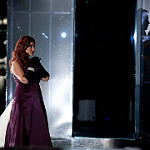The Metropolitan Opera’s 2017 production of Giuseppe Verdi’s La Traviata (The Fallen Woman) broadcast on PBS’s Great Performances on August 25, 2017 features spectacular singers. Sonya Yoncheva as Violetta Valéry, Michael Fabiano as her lover Alfredo Germont, and Thomas Hampson as Alfredo’s father Giorgio Germont portray the opera’s strong emotions powerfully. When they sing together, their voices blend in brilliant harmony. By combining acts 2 and 3 without an intermission, this fast-paced production builds suspense and emotional intensity. Nicola Luisotti conducts the orchestra flawlessly. However, I question many of the choices of Director Willy Decker. Setting the show in the twenty-first century, dressing all women except Violetta and Annina in male garb, emphasizing the huge clock, and having Dottore (Doctor) Grenvil constantly onstage distract the audience from the major themes of La Traviata.
Verdi’s opera is based on the novel (1848) and play (first performed in 1852) by Alexandre Dumas, fils, entitled La Dame aux Camélias (The Lady with the Camellias). Dumas modeled the title character on his mistress Marie Duplessis. Wanting to exploit the drama’s success, Verdi and librettist Francesco Maria Piave created the 1853 opera La Traviata. Thematically, both the play and the opera stress the difficult life of courtesans in the mid-nineteenth century and present the heroine as loving, caring, and virtuous. Both imply that society often stereotypes and mistreats women who make their living in the sex trade.
In the mid-nineteenth century, there were not many jobs that would enable a single woman to support herself. That is why women turned to prostitution. But in the twenty-first century, women have many more opportunities for employment. By moving the setting of La Traviata from roughly 1850 to 2017, Director Willy Decker diminishes sympathy for Violetta because a single woman in 2017 does not have to choose the sex trade to survive. Furthermore, while parents in 1850 would worry that having one’s son living with a courtesan could definitely endanger the marriage of their daughter, such concerns are much less likely to arise in 2017, when people are more open-minded and respect different lifestyles.
Decker chose to costume all of the women singers except Violetta and her maid Annina in dark business suits just like those of the men in this production. This sets off Violetta’s red and white gowns and highlights her character. However, the drama script and the opera libretto do not refer to any cross-dressing. In addition, the heterosexual party and ball scenes look weird with most members of the chorus and even Violetta’s best friend Flora in all male garb.
Because Violetta has tuberculosis (called consumption in 1850), her days are numbered. Decker underlines her short life expectancy by placing a huge clock prominently in every scene. Certainly, most prostitutes in 1850 lived in terrible conditions, and many died of tuberculosis and venereal disease. However, in 2017 we have effective treatments for these diseases. Also, neither Dumas’ drama nor the opera libretto for La Traviata highlight the passage of time, so I see no reason to have a gigantic clock always on stage.
Dottore (Doctor) Grenvil is a minor character in the opera. Why does he have to be in every scene? There is no basis for this in the drama or the libretto. Furthermore, the themes of the play and the opera do not focus on illness but on society’s treating prostitutes as outcasts.
I understand the impulse of a director to try to make each production unique. However, when a production makes illogical departures from the original script and libretto, these choices undermine the drama’s or opera’s ideas and themes.
